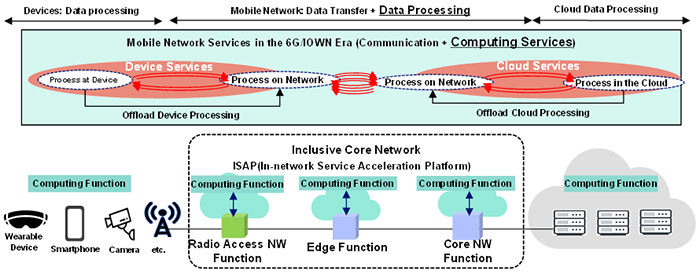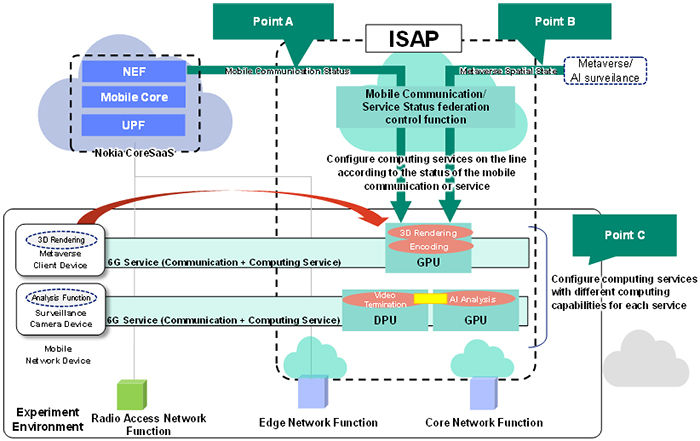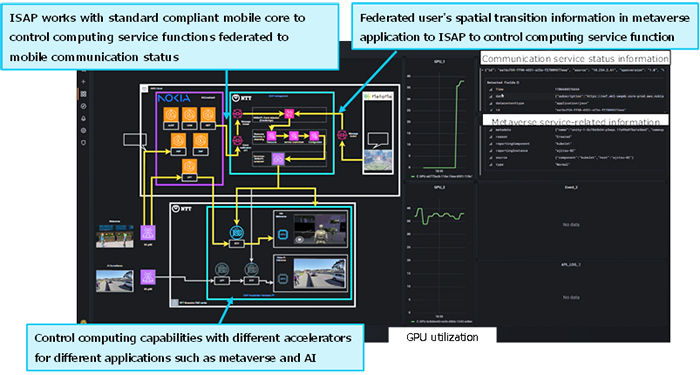Support for in-network computing that can assist the load on the device
NTT Corporation (NTT) and NTT DOCOMO, INC. (DOCOMO) have jointly demonstrated a mobile network equipped with In-network computing functions. In the experiment, NTT and DOCOMO expanded the 3GPP standards-compliant mobile core network based on the concept of the “Inclusive Core(1)” proposed by NTT as the core network for the 6G/IOWN era.We demonstrated for the first time in the world(2) that high performance applications can be used with low latency by dynamically allocating the computing resources within the network depending on the characteristics of mobile devices and communications. This result will make it possible to reduce device processing load by assisting devices with low-latency and high-performance computing functions provided in the network. It is also expected that 6G/IOWN-era services, which require high-performance processing capabilities on the device side, will be used without depending on device performance.Our demonstration will be showcased at Nokia’s booth during the Mobile World Congress in Barcelona, organized by GSMA from February 26th to 29th, 2024.
Latest CIO Influence Article: Understanding Alpha Ransomware and its Operational Framework
1. Background and Purpose
Existing mobile networks transfer data independently of device and cloud data processing. Because of this functional split, device and cloud services could not work together closely. On the other hand, 6G requires that device and cloud services work together closely to realize advanced services such as cyber-physical convergence(3). NTT and DOCOMO are taking on the challenge of solving problems such as device and cloud federation by computing functions including GPUs and other accelerators in the In-network Service Acceleration Platform (ISAP)(4). ISAP accelerates the federation between the device and the cloud in low-latency and high-capacity 6G networks by offloading the processing previously performed on devices. This enables metaverse services that require high processing power for 3D rendering, to be provided at low latency even on simplified devices, such as smart glasses.


2. Proposal for mobile network and computing convergence
ISAP is a technology that provides the following as the technical elements of the convergence of mobile network and computing:
Provide computing resources according to the mobile communication status of the deviceProvide computing resources according to the status changes in cloud serviceDynamic control of optimized computing resources according to the characteristics of mobile networks and each cloud service3. Overview of Demonstration Experiments
In our joint work, ISAP orchestrated the compute resource management with the support of Nokia’s 5G Core SaaS. The federation with ISAP and Network Exposure Function (NEF)(5), part of Core SaaS, enabled ISAP management system to efficiently scale the computing resource for new applications.The following three points were confirmed in the ISAP demonstration experiment.
A. Provide computing resources according to the mobile communication status of the deviceWe have confirmed that computing services can be integrated and controlled in the mobile network, depending on the connectivity status of the devices acquired via NEF from the mobile core network. We have also confirmed that this procedure can be completed in a time equivalent to the normal procedure for connecting to a mobile network.
Read More: How Cloud Computing Reshapes Banking and Finance
B. Provide computing resources according to the status changes in cloud serviceIn a metaverse use case, we have confirmed that computing services with GPUs for high-performance rendering, encoding, and decoding can be controlled based on the state of the service. We have also confirmed that computing resources can be allocated within the metaverse state change time.
C. Dynamic control of optimized computing resources according to the characteristics of mobile networks and each cloud service In addition to the metaverse, even if each service has different characteristics, such as a service that uses AI to analyze a video stream of a surveillance camera, we have configured a computing service by dynamically combining computing functions such as GPU and DPU without involving CPU, and confirmed that it can be provisioned in time equivalent to the normal procedure.


4. Role of each company in the demonstration experiment
Demonstration experiments on the convergence of mobile network and computing for 6G were conducted in the following areas.
– DOCOMO: Studies implement method and experimental configuration utilizing knowledge of mobile core network architecture and global standards, and provides a metaverse application
– NTT: Provides a test environment for inclusive core ISAP technology, AI video analysis application, and conducts demonstration experiments
– Nokia: Provides Core SaaS5.
5. Outlook
NTT and DOCOMO will continue to study and demonstrate use cases and architectures for 6G networks that integrate mobile networks and computing. We will also continue to study ways to provide services that allow users to use services regardless of device processing power or service characteristics. NTT and DOCOMO will also work with Nokia to promote standardization of 6G. In addition, we will expand our collaboration with telecommunications carriers, equipment and device manufacturers, cloud providers, service providers, and others to promote research and development of the 6G/IOWN-era convergence of mobile networks and computing (In-Network Computing(6)) and the provision of its services.
This technology concept transfers the processing function of the application layer to the data transfer function in the network, and achieves high-performance and high-performance services while reducing latency and device power consumption. Offloading information processing to switches and other devices in the network is expected to reduce device load.About NTT
4) In-network Service Acceleration Platform (ISAP)
As In-Network Computing, it mediates information processing related to services on devices and in the cloud, and forms a cascading processing base on hardware in the network that is suited to the communication environment and the service usage environment, while synchronizing and coordinating both at high speed. The network cooperates and speeds up information processing between terminals and the cloud anytime and anywhere, leading to the creation of flexible service experiences that are not limited by customer environments, devices, or services. ISAP enables the use of a variety of advanced services, regardless of device specifications or access network environments, to reach more users than service providers.
(1) Inclusive Core
NTT’s 6G/IOWN-era network architecture
Achieves a variety of convergence and collaboration over the network, enabling the convergence of computing and network needed for 6G/IOWN use cases such as AI-integrated communications and cyber-physical systems.
(2) As of February 21, 2024, according to NTT and DOCOMO
(3) Cyber-physical convergence
Services and systems for realizing a better and more advanced society by collecting information in real space (physical space) from various sensors, etc. and linking it to virtual space (cyberspace).
*DOCOMO 6G White Paper
(4) In-network Service Acceleration Platform (ISAP)
As In-Network Computing, it mediates information processing related to services on devices and in the cloud, and forms a cascading processing base on hardware in the network that is suited to the communication environment and the service usage environment, while synchronizing and coordinating both at high speed. The network cooperates and speeds up information processing between terminals and the cloud anytime and anywhere, leading to the creation of flexible service experiences that are not limited by customer environments, devices, or services. ISAP enables the use of a variety of advanced services, regardless of device specifications or access network environments, to reach more users than service providers.
(5) Network Exposure Function (NEF)
Network function for providing information held in a mobile communication network to the outside
(6) In-Network Computing (INC)
This technology concept transfers the processing function of the application layer to the data transfer function in the network, and achieves high-performance and high-performance services while reducing latency and device power consumption. Offloading information processing to switches and other devices in the network is expected to reduce device load.About NTT
NTT contributes to a sustainable society through the power of innovation. We are a leading global technology company providing services to consumers and business as a mobile operator, infrastructure, networks, applications, and consulting provider. Our offerings include digital business consulting, managed application services, workplace and cloud solutions, data center and edge computing, all supported by our deep global industry expertise. We are over $97B in revenue and 330,000 employees, with $3.6B in annual R&D investments. Our operations span across 80+ countries and regions, allowing us to serve clients in over 190 of them. We serve over 75% of Fortune Global 100 companies, thousands of other enterprise and government clients and millions of consumers.
Latest CIO Influence Article: Top 10 Application Security Trends for CIOs in E-commerce
[To share your insights with us as part of editorial or sponsored content, please write to sghosh@martechseries.com]


